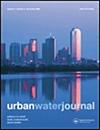Numerical investigation of depth-dependent roughness and infiltration methods in rainfall-runoff experiments
IF 1.6
3区 环境科学与生态学
Q3 WATER RESOURCES
引用次数: 0
Abstract
ABSTRACT The Hydroinformatics Modeling System (HMS) was used to simulate rainfall-runoff experiments to investigate the impact of different slopes and rainfall intensities for traditional and low-impact development (LID) surface conditions. HMS solves the depth-averaged 2D shallow water equations with robust numerical methods. Most importantly, depth-dependent roughness and depth-dependent infiltration methods are implemented and allow the model to simulate a bunch of scenarios. Calibration and validation results are evaluated based on the criteria of the Nash-Sutcliffe Efficiency (NSE) and Standard Deviation Ratio (SDR). Both, the calibration and validation cases achieve very good agreements between computations and measurements with NSE all higher or equal than 0.97 and SDR all smaller or equal 0.17. The results demonstrate the superiority of the depth-dependent infiltration method when compared to a constant infiltration and the necessity of the depth-dependent roughness approach for accuracy and stability reasons. The methods implemented here might also improve other shallow water models.降雨径流试验中深度相关粗糙度和入渗方法的数值研究
摘要利用水文信息学建模系统(HMS)模拟降雨径流实验,研究不同坡度和降雨强度对传统和低影响开发(LID)地表条件的影响。HMS采用稳健的数值方法求解深度平均的二维浅水方程。最重要的是,实现了深度相关粗糙度和深度相关渗透方法,使模型能够模拟一系列场景。校准和验证结果基于Nash-Sutcliffe效率(NSE)和标准偏差率(SDR)标准进行评估。校准和验证案例都在计算和测量之间实现了非常好的一致性,NSE均高于或等于0.97,SDR均小于或等于0.17。结果表明,与恒定渗透相比,深度相关渗透方法具有优越性,并且由于精度和稳定性的原因,深度相关粗糙度方法是必要的。这里实现的方法也可能改进其他浅水模型。
本文章由计算机程序翻译,如有差异,请以英文原文为准。
求助全文
约1分钟内获得全文
求助全文
来源期刊

Urban Water Journal
WATER RESOURCES-
CiteScore
4.40
自引率
11.10%
发文量
101
审稿时长
3 months
期刊介绍:
Urban Water Journal provides a forum for the research and professional communities dealing with water systems in the urban environment, directly contributing to the furtherance of sustainable development. Particular emphasis is placed on the analysis of interrelationships and interactions between the individual water systems, urban water bodies and the wider environment. The Journal encourages the adoption of an integrated approach, and system''s thinking to solve the numerous problems associated with sustainable urban water management.
Urban Water Journal focuses on the water-related infrastructure in the city: namely potable water supply, treatment and distribution; wastewater collection, treatment and management, and environmental return; storm drainage and urban flood management. Specific topics of interest include:
network design, optimisation, management, operation and rehabilitation;
novel treatment processes for water and wastewater, resource recovery, treatment plant design and optimisation as well as treatment plants as part of the integrated urban water system;
demand management and water efficiency, water recycling and source control;
stormwater management, urban flood risk quantification and management;
monitoring, utilisation and management of urban water bodies including groundwater;
water-sensitive planning and design (including analysis of interactions of the urban water cycle with city planning and green infrastructure);
resilience of the urban water system, long term scenarios to manage uncertainty, system stress testing;
data needs, smart metering and sensors, advanced data analytics for knowledge discovery, quantification and management of uncertainty, smart technologies for urban water systems;
decision-support and informatic tools;...
 求助内容:
求助内容: 应助结果提醒方式:
应助结果提醒方式:


